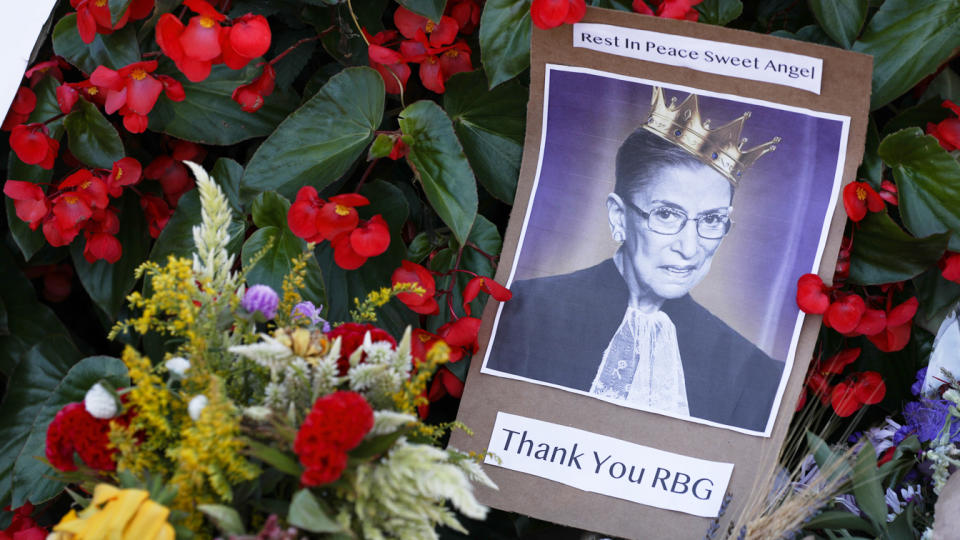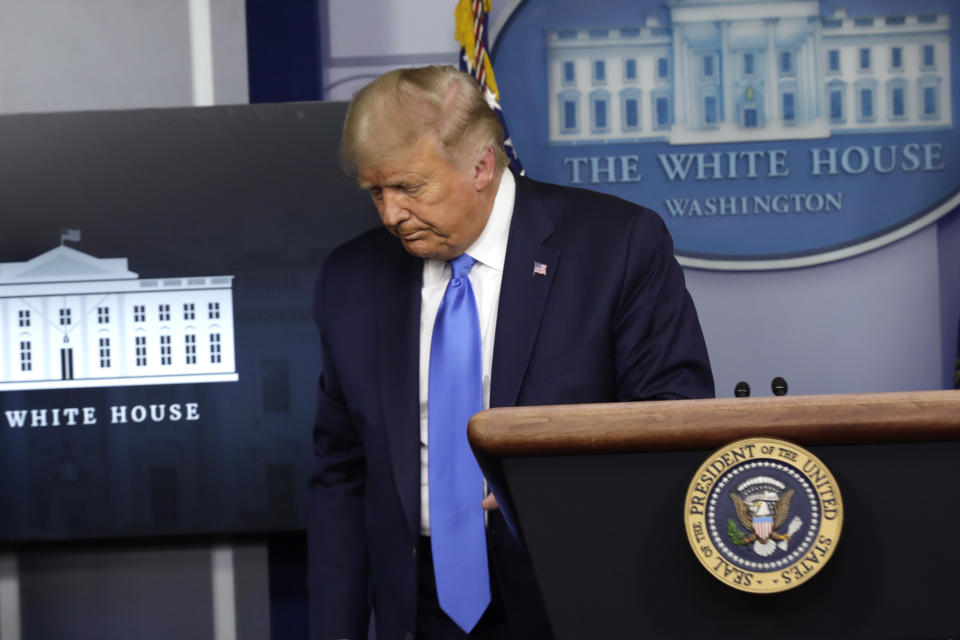Yahoo News/YouGov Poll: Presidential race tightens even as most voters oppose GOP's push to replace Ginsburg before election
Joe Biden’s lead over Donald Trump has shrunk from 10 points two weeks ago to 5 points today, according to a new Yahoo News/YouGov poll.
Yet most voters oppose the GOP’s pre-election push to fill the Supreme Court vacancy created by the death of Ruth Bader Ginsburg, and Biden supporters seem more energized than Trump supporters by the issue.
The survey, which was conducted from Sept. 21 to Sept. 23, found that after leading Trump 49 percent to 39 percent among registered voters earlier this month, Biden now leads 45 percent to 40 percent. The shift was within the poll’s margin of error (4.1 percent), yet there are signs Biden has lost some support among white voters and voters over 65 even as Trump has failed to grow his base much beyond the 40 percent mark. National polling averages show Biden ahead by about 7 percentage points.

At the same time, the battle to replace Ginsburg threatens to scramble the presidential contest — and here, a majority of voters agree with Biden that after voters “pick the [next] president,” the next “president should pick the justice for the Senate to consider.”
According to the poll, a full 53 percent of registered voters say that whoever wins the 2020 election should nominate the next Supreme Court justice; just 40 percent say the current president should pick Ginsburg’s successor. Voters also say by the same 13-point margin that the Senate elected in November (51 percent) should vote to confirm the next justice — not the current Senate (38 percent).
Overall, registered voters trust Biden (49 percent) more than Trump (42 percent) to nominate the next Supreme Court justice.
The precedent created in 2016 when Republican Senate Majority Leader Mitch McConnell refused to consider Barack Obama’s final Supreme Court pick in an election year looms large in voters’ minds; by a 14-point margin (47 percent to 33 percent) they say Republican senators are being hypocritical when they agree to hold hearings and vote on Trump’s nominee so close to an election.
In theory, this could hurt Republicans on Election Day. The GOP currently controls 53 Senate seats, and at least 10 of those are seen as vulnerable. Asked which party they would like to control the Senate in 2021, a majority of registered voters say Democrats (54 percent) rather than Republicans (46 percent).
The electoral politics of the coming Supreme Court fight are tricky to decipher at this early stage, and it may be that few voters flip because of it. While a larger number of voters say they are “more likely” to vote Democratic (36 percent) than Republican (29 percent) as a result of Ginsburg’s death and the push to fill her seat, the vast majority in each category are already supporting Biden or Trump, respectively.

Only 3 percent of Biden voters say the Supreme Court skirmish makes them more likely to vote Republican; just 2 percent of Trump voters say it makes them more likely to vote Democratic. Likewise, a mere 2 percent of Biden voters say they’d be more likely to vote for their senator if he or she votes to confirm Trump’s nominee; the same percentage of Trump voters say they’d be less likely to vote for their senator in that scenario.
In other words, whatever small number of Supreme Court swing voters there are, they’re liable to cancel each other out.
Yet contrary to the conventional wisdom that court fights motivate Republicans more than Democrats, it’s Biden supporters who seem more energized than Trump supporters — at least at this early stage. In fact, 86 percent of those who intend to vote for Biden say appointments to the Supreme Court are either the “most important factor" (40 percent) or an “important factor” (46 percent) in their presidential vote — 7 points higher than the corresponding number among those who intend to vote for Trump (37 percent “most important,” 42 percent “important”).
Beyond energizing the Democratic base, there are other risks ahead for Trump and the GOP. If the president nominates a pro-life justice who is also inclined to rule against the Affordable Care Act — as is widely expected — voters may balk. Just 29 percent of registered voters think that Roe v. Wade should be overturned; 54 percent do not. The same number (29 percent) think the court, which is hearing an ACA case on Nov. 10, should invalidate President Barack Obama’s signature health care law; 50 percent do not.
Abortion has long been seen as a wedge issue for both parties, but in this case, the danger may be greater for Trump. Just 51 percent of his voters actually want to overturn Roe v. Wade; a full 29 percent do not. Among Biden voters, opinion is much less divided, with 77 percent saying they want Roe to remain the law of the land and a mere 9 percent saying the opposite.

It’s possible, however, that Democrats could overplay their hand. Voters show either tepid support or opposition for measures some Democrats are vowing to take as retaliation for Republicans filling the vacancy before the election.
Only 32 percent support increasing the number of justices to the Supreme Court (39 percent oppose, 29 percent are unsure). Just 37 percent support abolishing the filibuster so that 40 senators cannot block legislation (23 percent oppose, 39 percent are unsure). And voters are divided 35 percent to 35 percent on whether it is a good or bad idea to expand the court “so that five justices are affiliated with the Republicans, five are affiliated with the Democrats, and five are apolitical and chosen by the other 10 justices.”
The only such measure that commands anything approaching majority support (50 percent) is admitting Puerto Rico as a state. Admitting Washington, D.C., is less popular (42 percent).
Asked directly which of these measures Democrats would be “justified” in doing if they win the election but Republicans confirm Trump’s nominee anyway, more voters said none of the above (41 percent) than any of the individual proposals, which all garnered 35 percent support or less. Even support for admitting Puerto Rico as a state fell to 35 percent in this “retaliatory” scenario.
The problem with remaking the Supreme Court is that even though 67 percent of voters say it has become too politicized, a majority of them (57 percent) approve of the way it’s handling its job, with only modest differences by party. Just 24 percent disapprove. An even larger majority (70 percent) have either some (50 percent) or a lot (20 percent) of confidence in the institution.
The corresponding number for Congress? Just 37 percent.
__________________
The Yahoo News survey was conducted by YouGov using a nationally representative sample of 1,284 U.S. registered voters interviewed online from Sept. 21 to 23. This sample was weighted according to gender, age, race and education based on the American Community Survey, conducted by the U.S. Bureau of the Census, as well as 2016 presidential vote, registration status, geographic region and news interest. Respondents were selected from YouGov’s opt-in panel to be representative of all U.S registered voters. The margin of error is approximately 4.1 percent.
_____
Read more from Yahoo News:



